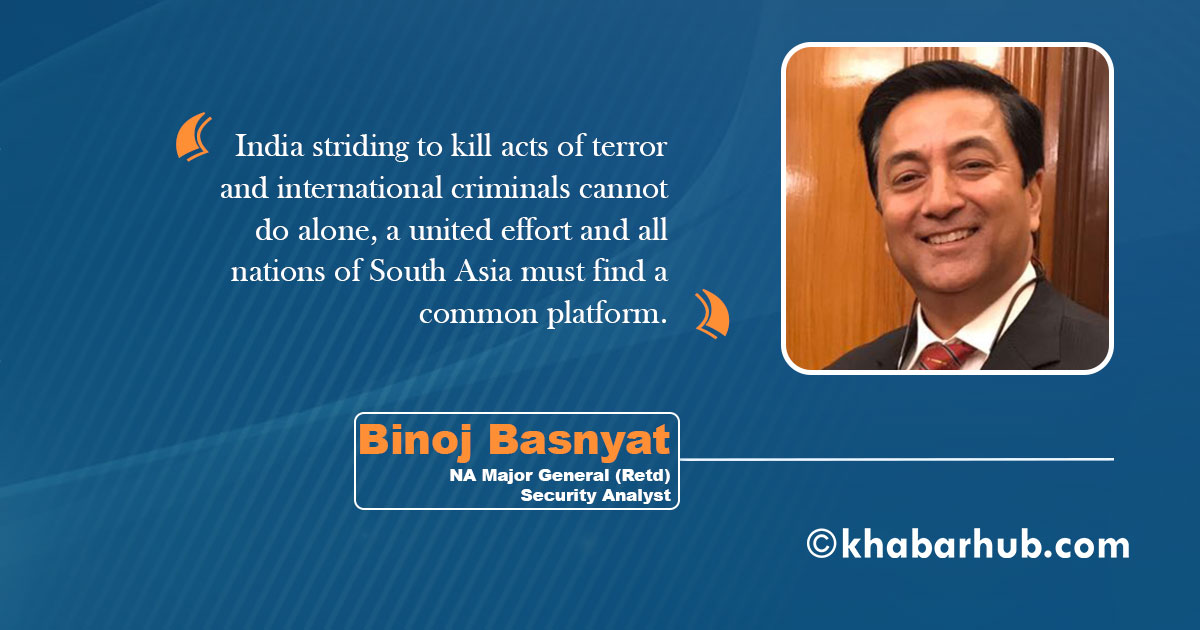India appeared diplomatically active to obtain global support after abrogation of Article 370 and 35A of the constitution. In show of support to Government of India, both the United States (US) and Russia -contenders to exert more global influence came forward to stand by India in the United Nations (UN) discussions among the fifteen members of the Security Council on 16th April. It was a closed door meeting in which neither party was invited. Kashmir once again appeared in the international news.
Pakistan had condemned the move of changing the administrative structure of Jammu and Kashmir by removing Articles 370 and 35-A of the Constitution of India. Pakistan sought appropriate measures to undo the Indian parliament decisions and China had also expressed strong worries over the Indian action. The Russian assessment of the major geopolitical issue, as well as the backing of the changed status of Jammu and Kashmir (J&K) which have been made within the framework of India’s constitution has made it clear that the long-standing territorial dispute should be resolved bilaterally in accordance with relevant UN resolutions. It hints at the meddling of global power as major powers are looking for political maneuvering in the Indo-Pacific region.
The Bharatiya Janata Party (BJP) government’s decision does not only have a regional impact but also have international significance.
The last time Kashmir was on the United Nations Security Council (UNSC) agenda was in 1965 and both India and Pakistan together was never a topic of discussion at the UNSC since 1971. PM Imran Khan tried utmost by calling President Trump prior to the discussion in the closed door meeting of the security council. Imran Khan expressed his apprehension to the President Trump regarding fast deteriorating India and Pakistan relationship in the South Asia due to issue concerning J&K.
The Bharatiya Janata Party (BJP) government’s decision does not have just a regional impact but also have its wide international significance. World politics in globally connected world have made the world ‘borderless‘ and also interdependent. Contested issues need to be combined together to see them in prism of unity rather than from the system of division.
The world is witnessing conflicts of various types in different regions. The possibility of armed conflicts and specter of war in the South Asian region remains very high. In this context: there are three important global transformations that need to be considered.
First is the shift in the political gravity of international affairs from the Atlantic to Asia-Pacific region that strengthens the concept of Geo-economic regionalism and multilateral-ism. Second is an increase in transnational ecological, social, gender and peace movements by civil society and third is the National Security Strategy 2017 adopted by the US in the Indo-Pacific region with one of the four pillars among others is advancing American influence.
The only global power the US, other major powers and rising powers were at the center with India when China backed Pakistan’s proposal to be discussed in the UNSC.
The strategy addresses both China and Russia as revisionist powers and competitors to US’s interests and values, while India is a strategic partner – a partner to fight against dictators, Jihadist terrorists that that spread terror and stir up hates against all who do not conform to them. Jihadists are guided by feeling of being only true followers of Allah and abhor all who are not like them due to their depraved ideology. They get support from international criminal gangs and drug traffickers who spill out drugs and violence into human communities across the world.
The US and Russia stood with India while China had a distinctive view. Though China stood on a different platform, the second informal meeting between Chinese President Xi Jinping and Prime Minister Narendra Modi is being held in Varanasi (-Modi’s parliamentary constituency) in upcoming month of October. This is an important diplomatic engagement, though informal in nature, after the Wuhan informal meeting held last year in April 2018. Definitely, the meeting will bring both the leaders face to face furthering cooperation in other strategic issues and shaping the geopolitical and geo-economics of the region particularly in South and East Asia.
China is also part of the disputes in Kashmir because it has occupied a region of Akshai Chin and accepted the Shaksgam Valley as a gift from Pakistan’s POK (Pak-occupied Kashmir). China has raised the concern in a different fashion: One, to consolidate China and Pakistan Economic Corridor project and win the confidence of people of Pakistan because ‘Belt and Road Initiative (BRI)’ is a nerve to China’s progress. Two, to assure sense of reliability and confidence to other nations of South Asia when it comes to policies adopted by India aiming at them. China’s interests in South Asia through projects of the BRI for political and security influence is no doubt persistent.
The Indo-Sino cooperation is always more important than other competitive gesturing between India and China which keeps on going unabated. The interests of major powers are visible both at the global body informal discussion and their projection on views and posturing while quoting Article 370 with reference to Jammu & Kashmir.
The only global power the US, the major powers and rising powers were at the side of India when China backed Pakistan’s proposal to be discussed in the UNSC.
The volatile situation surrounding the India’s decision of abrogation of Article 370 was of central concern and discussion focused solely on the dispute rather than passing the resolution; but the Chinese Ambassador spoke to the reporters following the deliberation expressing serious concern urging both the countries resolve the Kashmir issue through peaceful means, in accordance with the UN Charter, the relevant Security Council resolution and bilateral agreements”.
UN Secretary-General Antonio expressed concerns and appealed for maximum restraint and also recalled the 1972 Shimla Agreement, which states that the final status of J&K is to be settled by peaceful means between the two countries India and Pakistan in accordance with the UN Charter on 8th Aug prior to the closed discussion at the UNSC.
It cannot be denied that apprehensions between the powers have ascended so have deliberations of Thucydides trap- the thought that competition and rivalry between customary power and the growing one will eventually result in war.
China diplomatically asserted for bilateral talks, the other fourteen members did not speak on the verdict. The fifteen-member UNSC did not come out with anything – they did not have any agreement to force a formal meeting, had no minutes, no votes or show of hands, no resolution, no statements, and no outcome.
On 19th August, Trump in a telephone conversation with both Modi and Imran Khan talked regarding Trade, Strategic Partnerships and, most importantly, for India and Pakistan to work towards reducing tensions in Kashmir, while Modi highlighted the importance of creating an environment free from terror, violence and eschewing cross-border terrorism and India’s longstanding, unwavering commitments to work for united, secure and democratic Afghanistan. He “urged restraint on both sides”.
Washington’s 2018 decision to impose tariffs on almost half of Chinese goods and 2019 decision to withdraw India’s preferential trade treatment highlighted and execrated a growing geopolitical completion between the global power and the rising powers of the Indo-Pacific.
It cannot be denied that apprehensions between the powers have ascended to a peak level which amount to have have deliberations of Thucydides trap- the thought that competition and rivalry between customary powers will eventually result in war.
Geopolitical Implications
There are competing five narratives touching upon domestic aspects, international angles and implication, South Asian aspects, development in Afghanistan and China’s angle. The 67-year-old special status of J&K has been revoked and carved out into two Union Territories for development, peace and most importantly to end the disputes.
J&K has become full fledged state with no separate recognition given to it by the Indian constitution. The controversial Articles 370 and 35-A have been diluted and thus removed by the elected body by the people of India – the sovereign parliament of India. There is an argument by some opinion makers that the Kashmir’s issue has shifted from being an international issue in 1947 to a bilateral one in 1972 (Shimla Agreement) and now it has become entirely an internal matter of India on Aug 5, 2019.
Pakistan failed to provoke India and couldn’t attract the attention of international community because of the unfortunate track record of its state being involved in (and supporting) acts of terror in India and other parts of the world.
This has come before the conjectured election in J&K amid Governor’s rule in the state, development in Afghanistan for a peaceful resolution through “Good Agreement” between the US and the Taliban as well as before the celebration of 73rd Independence Day of India.
Domestic Aspects
The two-third majority decision by the Indian Parliament regarding revocation of Articles 370 and 35-A is driven more out of national spirit and less by any short-term political considerations. The decision is aimed at focusing on development, ending corruption and freeing the region from family rule and boosting economic growth in the region of J&K. Never to miss, it is also important for the unity of the nation. However, the removal of the article has for long been part of the election manifesto of the ruling party of India – the Bhartiya Janata Party (BJP).
One country one system will now be the mantra to administer the state. It is also a message for Seven Sisters states in the Northeast India. The decision will further impact on the ongoing Naga-peace talks and any future deal deal for autonomy. Pakistan’s behavior and support to acts of terror have been propping from time to time through infiltration and incidents in J&K and the using other countries in the process is to destabilize India purely out of hatred to strike terrorism and has nothing to do with any kind of political ideology.
International Angles and Implications
Pakistan failed to provoke India and couldn’t attract the attention of international community because of the unfortunate track record of its state being involved in (and supporting) acts of terror in India and other parts of the world. Pakistan has been named and shamed several times because of its direct involvement in terrorist activities to outside world but the country is once again talking about launching the Jihadist activities in J&K.
The status of India as a rising power is also being tested now. The diplomatic leverage of India is on the rise and is listened to with respect in international circle and dealt with accordingly by the international community. The 117 strength (72 civilians and 45 experts) United Nations Military Observers Group in India and Pakistan (UNMOGIP) that was deployed in Jan 1949 to observe development pertaining to the strict observance of the ceasefire does not have a competent track and the closing of the mission is to be initiated without any further delay.
Development in Afghanistan
The election in Afghanistan is coming up next month, while the peace talks between the US and the Taliban are being watched attentively by the voters of both the nations and the international community. Trump will also seek re-election next year and he is desperately looking for an honorable exit route to pull the American forces from Afghanistan in order to consolidate the mindset of the American voters.
Pakistan will also play all the cards, insincerely though, to start a peace process by bringing India on the negotiating table. India developmental activities in Afghanistan may be hampered in a major way if Pakistan plays foul once again. The position from where Taliban was viewed in India has altered especially after the resumption of the peace talks between the US and the Taliban.
China Angle
The nation-states along with the Himalayan range from the Karakorum to Bhutan—a 2,400 km arc separating the Indian subcontinent from the Tibetan Plateau—are growing increasingly significant in the geo-strategic and geo-economic maneuvering of global powers. China’s BRI is visibly attempting to link nation-states within the region, reshaping the economic map by forming a connection between the six nations -Afghanistan, Bhutan, China, India, Nepal, and Pakistan.
Add to this mix is the way India and China constantly circle each other, further compounded by the interests of the US and a resurgent Russia. And, it is clear why this region has become so important in the global geopolitics. Amit Shah’s statement covering Pakistan occupied Kashmir and Aksai Chin will have implications and draw more Chinese soldiers crossing the territory of Indian state of Arunachal when 22nd Sino-Indo border talk is to take place later this year. China claims the state of Arunachal Pradesh which covers 3,488 km long Line of Actual Control as part of southern Tibet.
South Asian Nations Aspects
The South Asian region is geo-politically transforming and the small nations bordering China and India are geo-strategically important for foreign power-players. There will be no talks with Pakistan on Kashmir except to take POK. The assertion of Modi-Government will further hamper like the South Asian Association for Regional Cooperation (SAARC). The international powers are interested in South Asian region because of the tremendous economic opportunities coupled with huge market. At the same time, the region of South Asia is militarily very sensitive and the major world powers want to have their political and security influence felt in the region. Nepal as the chair of SAARC came out with a statement on abrogated Article 370 after two weeks dissimilar to other South Asian countries such as Bangladesh, Sri Lanka and the Maldives who in clear words mentioned that India’s actions on J&K are a purely internal matter.
Foreign Minister Pradeep Gyawali expressed concern over the Nepalese working in J&K as well as that Nepal is in favor of peace and stability in the region and a belief of any problems that surface being resolved through negotiations has stood for regional peace and stability and problems should be solved through dialogue.
Conclusion
Will the power shift to the Asia-Pacific when international power association, diplomatic coalition, security sensitivities, and economic connection evolve across the globe? In this world of complexities and interdependence where a zero-sum competition is the norm; China, India, and Pakistan must find a way to peacefully co-exist for regional stability and prosperity. Should we expect China to replace the US in the New Global Order? Only time will tell.
When the Asia Pacific is leaning towards growth, major actors China and India once again have differences of actions and their national interests. This issue has both political and diplomatic interest and ramifications for both the rising powers. China has moved to South Asia as it claims that India is moving towards the East Asian Nations. China apprehends that the alliance of the US with East Asian nations is meant for containing China.
Pakistan has two options either support skirmishes in Kashmir by infiltrating terrorists into Indian territories or go for war after the members of the UNSC appear to have little appetite to interfere in the issue. Meanwhile, Pakistan is attempting to internationalize the diplomatic efforts as the third options available to it.
Pakistan is arguing that the removal of Articles 370 and 35-A would change the demography and that it violates the relevant resolution of the UN (No. 47, 1948). India has to constantly work on ensuring stability in the region by expediting its efforts to restore the human rights in J&K and Laddakh.
The question remains if diplomatic efforts do not materialize, what will be the next move when the Wuhan informal meeting between Modi-I and Xi fails. Most likely, cooperation between the two countries will continue amidst the scenario of competitions between them.
The two Foreign Ministers meeting their counterparts in Beijing expressed the important role that China has to play in South Asia when the US and the International troops are on the stage of withdrawing from Afghanistan, which will impact all the bordering six nations.
India striding to kill acts of terror and international criminals cannot do alone, a united effort and all nations of South Asia must find a common platform.
Basnyat is a Nepal Army Major General (Retd.) and a Security Analyst.









Comment